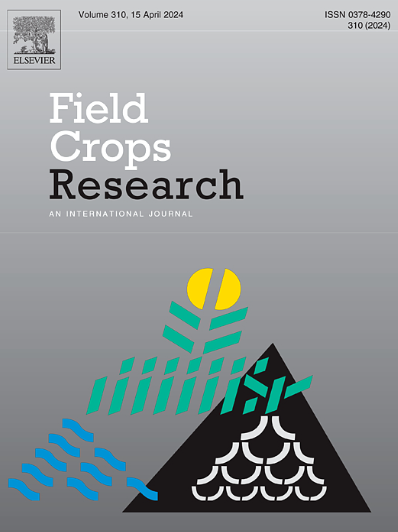豆科作物集约化技术与农艺管理之间的积极互动:来自参与式农场试验的证据
IF 5.6
1区 农林科学
Q1 AGRONOMY
引用次数: 0
摘要
坦桑尼亚的小农农业主要以玉米为主要作物,同时种植谷物豆类。矿物肥料和根瘤菌接种剂等技术可以提高豆类产量和整体农业产量,但它们的采用仍然有限。本研究探讨了这些技术在不同田间条件下的表现,并评估了它们与小农的相关性。方法于2022/2023年季节,在坦桑尼亚松圭地区不同农户的田间进行40项田间试验。我们评估了磷(P)肥和根瘤菌接种对大豆(Glycine max)和改良品种普通豆(Phaseolus vulgaris)产量的影响,以及农民对这些技术的看法。结果未经改良的对照田的粮食产量变化很大:大豆的产量从0.2 t ha - 1到2.3 t ha - 1,普通豆的产量从0.1 t ha - 1到1.2 t ha - 1,受土壤pH、土壤P等土壤特性和除草时间等农艺措施的影响。接种根瘤菌平均使大豆产量提高46%,但对普通大豆产量没有影响;平均施磷量分别使大豆和普通豆增产52%和50%。磷与接种相结合,大豆平均产量提高66%,普通豆平均产量提高75%。所有技术的平均投资回报率超过2,大豆接种因其成本效益而受到农民的青睐。在对照中,延迟除草导致大豆产量减少75% %。然而,施用磷肥和/或接种根瘤菌延迟除草对产量没有显著的负影响,表明这些技术与管理措施之间存在正交互作用。结论本研究结果显示了豆科作物强化技术的潜力,但存在可获得性、成本和市场挑战。本文章由计算机程序翻译,如有差异,请以英文原文为准。
Positive interactions between legume intensification technologies and agronomic management: Evidence from participatory on-farm experiments
Context
Smallholder farming in Tanzania centres predominantly on maize as the staple crop, integrated with grain legumes. Technologies like mineral fertilisers and rhizobial inoculants can enhance legume yields and overall farm production, yet their adoption remains limited.
Objectives
This study explores the performance of these technologies across diverse field conditions and assesses their relevance for smallholders.
Methods
In the 2022/2023 seasons, 40 on-farm experiments were conducted on diverse farmers’ fields in the Songwe region, Tanzania. We assessed the effects of phosphorus (P) fertilisers and Rhizobium inoculation on soybean (Glycine max) and common bean (Phaseolus vulgaris) yields with improved varieties, and farmer perceptions of these technologies.
Results
Grain yields in unamended control plots varied widely: from 0.2 t ha−1 to 2.3 t ha−1 for soybean and from 0.1 t ha−1 to 1.2 t ha−1 for common bean, influenced by soil properties such as soil pH, soil P, and agronomic practices such as timing of weeding. On average, Rhizobium inoculation increased soybean yields by 46 % but did not affect common bean yields; On average phosphorus application increased soybean and common bean by 52 % and 50 %, respectively. Combining P and inoculation raised mean soybean yields by 66 % and common bean by 75 %. Mean return on investment exceeds 2 for all technologies, with soybean inoculation favoured by farmers for its cost-effectiveness. Delayed weeding caused a 75 % reduction in soybean yield in controls. However, delayed weeding with P fertilisers and/or Rhizobium inoculation had no significant negative yield effect, indicating a positive interaction between these technologies and management practices.
Conclusions
Our findings show the potential of legume intensification technologies, yet with availability, cost, and market challenges.
求助全文
通过发布文献求助,成功后即可免费获取论文全文。
去求助
来源期刊

Field Crops Research
农林科学-农艺学
CiteScore
9.60
自引率
12.10%
发文量
307
审稿时长
46 days
期刊介绍:
Field Crops Research is an international journal publishing scientific articles on:
√ experimental and modelling research at field, farm and landscape levels
on temperate and tropical crops and cropping systems,
with a focus on crop ecology and physiology, agronomy, and plant genetics and breeding.
 求助内容:
求助内容: 应助结果提醒方式:
应助结果提醒方式:


